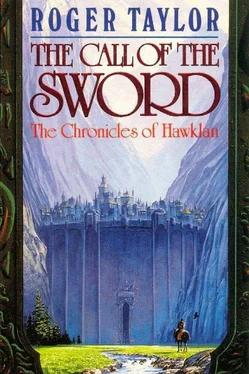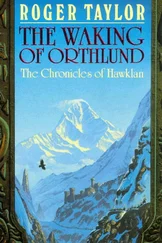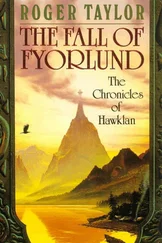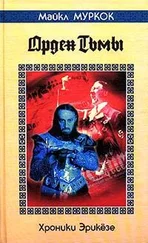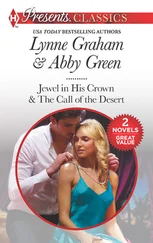Roger Taylor - The call of the sword
Здесь есть возможность читать онлайн «Roger Taylor - The call of the sword» весь текст электронной книги совершенно бесплатно (целиком полную версию без сокращений). В некоторых случаях можно слушать аудио, скачать через торрент в формате fb2 и присутствует краткое содержание. Жанр: Фэнтези, на английском языке. Описание произведения, (предисловие) а так же отзывы посетителей доступны на портале библиотеки ЛибКат.
- Название:The call of the sword
- Автор:
- Жанр:
- Год:неизвестен
- ISBN:нет данных
- Рейтинг книги:3 / 5. Голосов: 1
-
Избранное:Добавить в избранное
- Отзывы:
-
Ваша оценка:
- 60
- 1
- 2
- 3
- 4
- 5
The call of the sword: краткое содержание, описание и аннотация
Предлагаем к чтению аннотацию, описание, краткое содержание или предисловие (зависит от того, что написал сам автор книги «The call of the sword»). Если вы не нашли необходимую информацию о книге — напишите в комментариях, мы постараемся отыскать её.
The call of the sword — читать онлайн бесплатно полную книгу (весь текст) целиком
Ниже представлен текст книги, разбитый по страницам. Система сохранения места последней прочитанной страницы, позволяет с удобством читать онлайн бесплатно книгу «The call of the sword», без необходимости каждый раз заново искать на чём Вы остановились. Поставьте закладку, и сможете в любой момент перейти на страницу, на которой закончили чтение.
Интервал:
Закладка:
‘Enough. I told you before that you abused my son’s friendship and my hospitality. Now you impugn the King and his advisers and you mention the name of that land at my Festival Feast.’ He pushed his chair back angrily and strode around the table until he stood facing Tirke.
Tirke stood very still, looking at him, his mouth tight and his eyes fearful.
‘Go to your quarters, Tirke,’ said Eldric, unexpect-edly quietly, but with a barely controlled rage. ‘Reflect on what you’ve said and allow calmer judgements to prevail. I’ll attribute your indiscretion to the fine wine we’ve had tonight.’
Tirke nodded an awkward bow and turned hesi-tantly as if to address the watching guests. Then he turned back to Eldric and a tremor passed over his face as he fought to control himself. He opened his mouth to speak, but Eldric’s eyes froze his words, and he turned away stiffly and marched to the doorway of the hall, his shoulders hunched high with tension and his fists clenching and unclenching.
Eldric watched the empty doorway for some time and then slowly returned to his seat. He slumped down on it despondently as the last of his anger suddenly left him. He felt slightly repentant. Tirke had been the recipient of the fears and shock that had arisen in him with the arrival of Hrostir and the Edict. He looked up at his guests sitting uncertainly about the table laden with the remains of the Festival Feast.
‘I’m sorry, my friends,’ he said, ‘but the lad went too far, Festival or no.’
There was a general murmur of agreement.
‘I think his heart’s in the right place, but his mouth’s another matter.’
The little jest eased the tension around the table and Eldric, sitting back in his chair, raised his hand to prevent anyone speaking.
‘I’ve already sent to the Lords Arinndier, Darek and Hreldar, and asked them to attend me here so that we can discuss this matter,’ he gestured towards the paper, ‘and decide what to do. If necessary we’ll go to Vakloss and ask the King for an accounting. I’m sure that some sound reason lies behind this deed, and that a simple asking will elicit it.’
No one offered any comment. Most of them were inclined to agree with Tirke, if not with his manners, but no one felt inclined to argue with their Lord that night. Eldric stood up and smiled.
‘I’m afraid I’ve disturbed our humble celebration and I apologize. However, I’ve done all that I can do about our news until my friends arrive so I see no reason why our festivities shouldn’t continue.’
He clapped his hands loudly and the hall was sud-denly filled with light and cheerful music. The clouds that had gathered disappeared as servants and guests alike hastily cleared the tables and began the traditional dancing and singing with which the beginning of the week-long Festival was always celebrated.
The Geadrol was the King’s Council of Lords. It advised him in all matters and was an ancient institution. It had no leader; not even the King himself when he chose to attend and join in the debates. Nor did it have any formal spokesman to take its considerations to the King; this task was allocated according to a strict rota.
The debates were governed by a strictly observed precedent. One Lord would speak, and would be allowed to say his piece fully, then another would speak similarly, a scribe taking note of all that was said. After a while, one Lord would, if he felt able, summarize the various arguments, referring as need arose to the scribe or to the Lords themselves for clarification. If his summary was accepted by the main participants, then the matter would be thrown open to further debate, and he would act as Gatherer until a satisfactory conclusion had been reached.
Necessarily, the task of Gatherer tended to fall mainly to the older and more experienced Lords, though by no means always.
The conduct of the Geadrol was the envy of houses of government in many distant lands, but its success was due mainly to the stern discipline of the Fyordyn and, as an institution, it did not travel well.
By tradition, the Lords in Geadrol were always dressed and armed for war, but voices were never raised, and interruptions were made only by the scribe or Gatherer. All had an opportunity to state their case as fully as they wished, and discussion continued until a wide agreement had been reached. The matter would then be laid before the King, whose acceptance was usually a formality.
Only when the nation was threatened could this procedure be modified, and then only slightly. The Geadrol would appoint a small group of its more experienced members to handle matters. They, together with the King, would use the same principle of thorough debate, but with less formality and greater urgency.
No one could say that the Geadrol was a form of government suitable for making rapid decisions, but under normal circumstances, the quality of the Lords’ debates, their judicious though not slavish regard for precedent, and their innate tolerance, ensured that such advice as was given to the King ensured in turn a society that was, for the most part, free from those disturbances that made rapid decisions necessary.
The whole was governed by the Law. Like the Gead-rol, this relied heavily on precedent and it could only be altered by the King and his Geadrol, ‘The greater part of the people freely consenting’.
When the guests had departed to their rooms, Eldric sat alone, surveying the scattered remains of the feast. The sight of his normally spartan hall so happily dishevelled, with its panelled walls and elaborately moulded ceiling lit by the traditional many-coloured torches, and everything decorated with winter and spring blossoms, never failed to induce a mellowness in him that he relished. His father had been a great celebrator of the Festival and its joy was rooted deep in Eldric’s memo-ries.
He nodded to himself. In spite of the sombre inter-ruption, it had been a lively affair, a fine honouring of the First Day of the Grand Festival.
There would be more events through the week: more feasting and dancing, bonfires, pageants, games and above all, traditional masques portraying the great events of Fyorlund’s history, with splendid arch-villains to be hissed, and great heroes to be cheered. It was a happy up-ending of all the normal social disciplines and Eldric knew that the traditional momentum of the Grand Festival would allow his guests to continue their celebrations largely unclouded by the news of the King’s actions. But he himself was less favoured. Now, for the first time since the Morlider War, matters of state responsibility would dominate his thoughts through this happy time, and drag his oldest friends from their own celebrations.
He frowned and leaned back in his chair. As he did so, his eye fell on the small shrine of the Four Guardi-ans. It was standing in its place of honour against the north wall of the hall where it had been placed with all due ceremony to mark the opening of the Festival. Around it were candles whose light glittered from the ubiquitous Fyordyn symbol that topped the shrine-a polished iron ring.
The shrine was a simple, old-fashioned piece of work. No one even dared to suggest to Eldric that he replace it with one of the more modern representations that came from Dan-Tor’s workshops in Vakloss. In his mind he knew its every detail. The figures were old and worn, and bore only intermittent traces of their original paintwork. They and their shrine had been in his family for many generations, and he remembered the feeling of comfort and security that they used to give him when he was a child. He smiled as he thought of it, and wondered if his own son, Jaldaric, would in turn look back on such a memory.
Читать дальшеИнтервал:
Закладка:
Похожие книги на «The call of the sword»
Представляем Вашему вниманию похожие книги на «The call of the sword» списком для выбора. Мы отобрали схожую по названию и смыслу литературу в надежде предоставить читателям больше вариантов отыскать новые, интересные, ещё непрочитанные произведения.
Обсуждение, отзывы о книге «The call of the sword» и просто собственные мнения читателей. Оставьте ваши комментарии, напишите, что Вы думаете о произведении, его смысле или главных героях. Укажите что конкретно понравилось, а что нет, и почему Вы так считаете.
